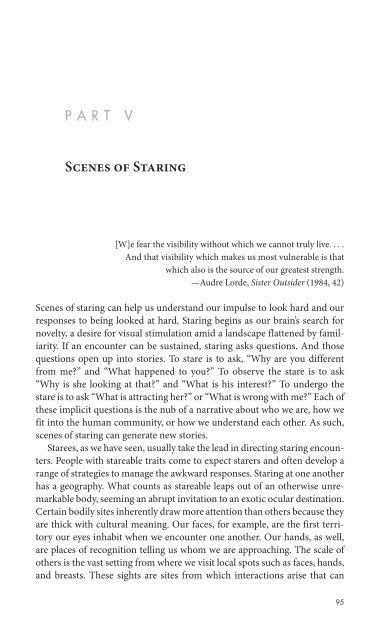Staring how we look sobre la mirada.pdf - artecolonial
Staring how we look sobre la mirada.pdf - artecolonial
Staring how we look sobre la mirada.pdf - artecolonial
Create successful ePaper yourself
Turn your PDF publications into a flip-book with our unique Google optimized e-Paper software.
A SOCIAL RELATIONSHIP 43<br />
The kind of staring that “fixes” a person in gender, race, disability, c<strong>la</strong>ss,<br />
or sexuality systems is an attempt to control the other. The study of the political<br />
nature of visual re<strong>la</strong>tions began in some sense with Simone de Beauvoir’s<br />
analysis in 1949 that Woman is the essential Other. Man subordinates<br />
Woman by setting himself up as the Self, according to De Beauvoir. This<br />
mandate for men to be Man and women to be Woman pressures gender re<strong>la</strong>tions<br />
toward inequality. In other words, men need to assume the position<br />
of dominators and women of subordinates to uphold social order and find<br />
their p<strong>la</strong>ce in it. In a skeptical turn, contemporary theorists in philosophy<br />
and cultural studies have understood <strong>look</strong>ing itself as a form of domination<br />
and produced abundant critiques of vision. 17 For example, Fredric Jameson<br />
sneers that the “visual is essentially pornographic,” its purpose being “rapt<br />
and mindless fascination” and its aim to seduce us “to stare at the world as<br />
if it <strong>we</strong>re a naked body” (1990, 1). <strong>Staring</strong> here is more corrupt than gazing,<br />
an emblem of distorted vision.<br />
This view of vision as surveil<strong>la</strong>nce advanced with Michel Foucault’s<br />
(1979) parable of the Panopticon. The Panopticon was Jeremy Bentham’s<br />
utopian and utilitarian architectural model of supervision in which a to<strong>we</strong>r<br />
allo<strong>we</strong>d observers to visually monitor inmates so as to discipline them. 18 Foucault<br />
recruits this architectural proposal as a metaphor for the self-regu<strong>la</strong>tion<br />
characteristic of modern individuals. The Panopticon enforces docility and<br />
self-control on those within visual reach through its potential for concealed<br />
domination staring. According to this revision of Freud’s superego function,<br />
<strong>we</strong> have internalized the threat of visual dominance, of being regu<strong>la</strong>ted<br />
by the stare. This form of institutionalized spying by those with authority on<br />
those without agency is for Foucault a fundamental social act of modernity.<br />
The Panopticon might be seen as a nascent high-tech form of Medusa’s evil<br />
eye. By institutionalizing the dominating stare, the idea of the Panopticon<br />
tames Medusa, stripping away her petrifying stare and rep<strong>la</strong>cing it with the<br />
banal surveil<strong>la</strong>nce camera <strong>we</strong>’ve all come to accept at the bank or the convenience<br />
store. Surveil<strong>la</strong>nce differs, <strong>how</strong>ever, from interpersonal face-to-face<br />
staring in that it is controlling, static, and exercised by the few on the many.<br />
In contrast, the philosopher Jean Paul Sartre offers a parable of interpersonal<br />
shaming through domination staring. The significance of the primal<br />
scene for Sartre is not simply seeing the sex act but rather imagining being<br />
caught staring at the primal sexual act through a keyhole. Driven by “jealousy,<br />
curiosity, or vice,” a starer is vulnerable for indulging in such profligate<br />
and inappropriate <strong>look</strong>ing (Sartre 1956, 235–36). This scene asserts the<br />
perversity of staring and the anxiety of being a staree. For Sartre, the Other<br />
is not the object of the dominating stare but instead the Other threatens<br />
witnessing the self as staree. “The Other <strong>look</strong>s at me,” Sartre c<strong>la</strong>ims, “and as<br />
such he holds the secret of my being, he knows what I am . . . . The Other has


